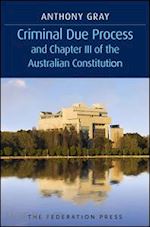
Questo prodotto usufruisce delle SPEDIZIONI GRATIS
selezionando l'opzione Corriere Veloce in fase di ordine.
Pagabile anche con Carta della cultura giovani e del merito, 18App Bonus Cultura e Carta del Docente
This book articulates the potential of the principle of separation of powers reflected in the structure and text of the Australian Constitution to protect fundamental due process rights. Clearly, the founding fathers did not enact an express bill of rights in the Australian Constitution, and the document contains a limited number of express rights. However, the High Court has accepted as fundamental the doctrine of separation of powers.
While the precise contours of the separation of powers principle are still being drawn, the High Court has found that laws which require, or authorise, a court to exercise power involving a departure from characteristics of traditional judicial process are constitutionally suspect. This is because such a law would undermine a court’s institutional integrity.
While the High Court has been somewhat loath to identify precisely characteristics of traditional judicial process, some indicia – including open courts, ability to review a decision of a lower court for jurisdictional error, the provision of reasons, decisional independence and fairness – have been identified. This book argues that fundamental due process rights in the criminal law area, such as presumption of innocence, the right to silence, the right to confront accusers, open courts, no effective punishment without conviction, and proportionate rather than mandated sentencing, are so fundamental to a criminal procedure that laws which abrogate these rights and expectations are vulnerable to constitutional challenge.
CONTENTS
Acknowledgments
Table of Cases
Table of Statutes
1. Introduction to Human Rights in Australia
2. The Separation of Powers
3. Open Courts, Natural Justice and the Right to Confront Accusers
4. The Right to Silence and the Privilege against Self-Incrimination
5. The Presumption of Innocence
6. Civil Forfeiture
7. Mandatory Sentencing
Conclusion
Index











Il sito utilizza cookie ed altri strumenti di tracciamento che raccolgono informazioni dal dispositivo dell’utente. Oltre ai cookie tecnici ed analitici aggregati, strettamente necessari per il funzionamento di questo sito web, previo consenso dell’utente possono essere installati cookie di profilazione e marketing e cookie dei social media. Cliccando su “Accetto tutti i cookie” saranno attivate tutte le categorie di cookie. Per accettare solo deterninate categorie di cookie, cliccare invece su “Impostazioni cookie”. Chiudendo il banner o continuando a navigare saranno installati solo cookie tecnici. Per maggiori dettagli, consultare la Cookie Policy.